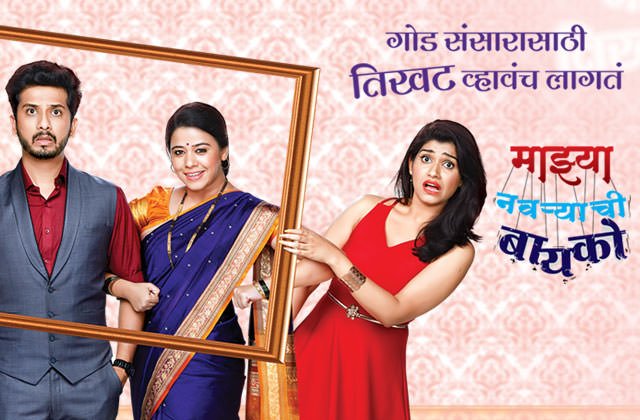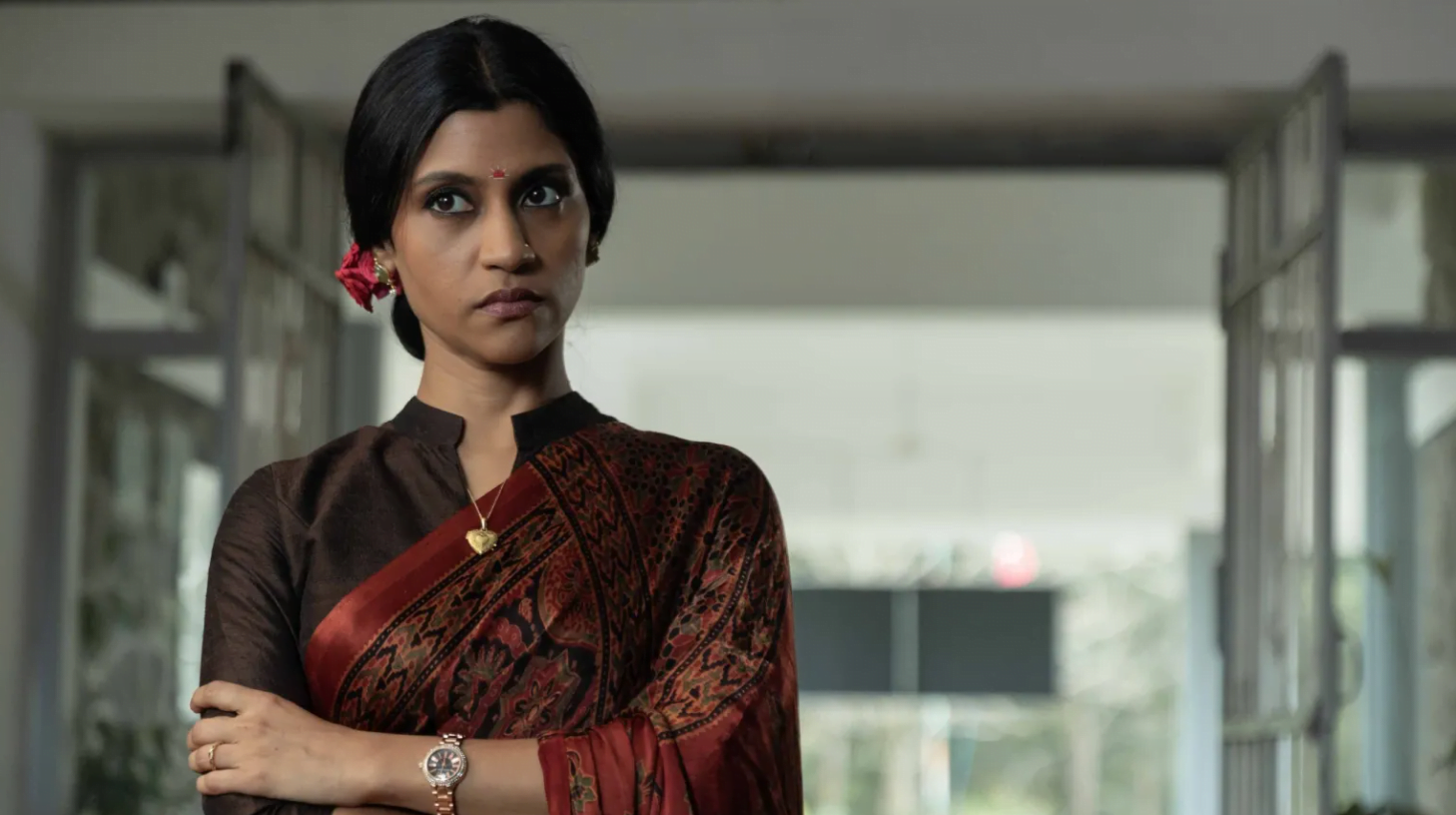As this recent piece on female leads in recent Marathi cinema demonstrates there seem to be some interesting shifts in the way women characters are being written. The same holds true for Marathi TV shows too. Women are increasingly shown to be working outside homes. They are also allowed to have desires outside those ordained by the family, and even outside their own linguistic, and even caste, community. And while these shifts are welcome, the limits within which they operate must also be identified.
Arguably Majhya Navryachi Baayko, which translates roughly to ‘My Husband’s Wife’, is a show that could do with such a close look. Its wild popularity is testimony to how well it speaks to the audience and their concerns. And predictably, these concerns do not bode well for women.
quite problematic to make a virtue of a wife who remains devoted even when the husband is unfaithful
The plot of the show revolves around a traditional, stay-at-home wife; a supposedly high-ranking ad professional husband; and the husband’s girlfriend who also happens to be his subordinate at work. This binary of the wife and the mistress has been around since time immemorial and of course, at first sight, the show seems as trapped in regressive mores as any other. For the most part it is. But what sets it apart from other shows of its ilk — the ones that allow free rein to a man’s desire and treat women as mere disposable units meant to service these specific types of desire — is its treatment of the wife figure.
Many see the fact that the wife, Radhika Subhedar, chooses to stay with a cheating husband as the show’s biggest problem. Yes, it is quite problematic to make a virtue of a wife who remains devoted even when the husband is unfaithful. This can only happen in a narrative written in service of patriarchy. At the same time, to simplify a conjugal arrangement to a mere question of monogamy is also a by-product of the same patriarchal ideology which seeks to hem in sexuality and desire.
Furthermore, a closer look at the show’s preoccupations reveal an attempt to engage with broader social changes in the roles of women. So even as more and more (admittedly a transitional phase only for the middle class, and largely savarna) women are working outside of homes, resisting the pressure to get married and have kids, and asserting their own identity, even endogamous, arranged matches are rife with a pull of contradiction. Any matches arranged through the family are most interested in maintaining the prevailing systems of gender and caste, even while throwing a bone in the direction of the “demands of kids today” or “girls today”.
So while matches are sought within the same community, in urban centres, educated men want to marry women who are not only similarly educated but also working and making money. They also want women “socially-polished” enough to make for representable and worthy exhibits outside the home. But they do not want anyone who might pose a radical challenge to either their power, or to that of their family.
Also Read: Film Review: On Sairat and Custodians of Love
Shanaya, Gurunath’s girlfriend and subordinate, signifies someone personifying that radical challenge and threat to the established order. She is so “western” in her orientation that she thinks everything that is traditional is “low-class” and gaavthi (a pejorative term to refer to all things of supposedly rural origin). This scorn is of course extended to Gurunath’s wife—an illiterate, “simple” (which is shorthand for someone not comfortable with western clothing) and dutiful upper-caste Hindu wife. She lives in with a married man but is resolutely uninterested in marrying him, a fact that even Gurunath finds offensive.
And yet Shanaya is portrayed as such a tone-deaf character that it is difficult to sympathise with her. Whatever real challenge she might have represented is watered down by taking away any semblance of integrity or independent-thinking. Even her malice is without teeth. So her supposed reason for being with Gurunath is his money and the fact that she can “use him”. In a world where other men might use her, she is doing the opposite.
But that’s not how the show wants us to see it. Because that would involve the recognition of a woman’s agency and a recognition of the actual systemic inequity she works in. All the other characters in the show are routinely warning Gurunath against women who will do anything for money, and about women today who might also go to the extent of filing fake police complaints of sexual harassment against men. They are of course, not so subtly, hinting at his girlfriend.
Apart from the quite irresponsible attempt to invalidate sexual harassment as an act of violence that women have to face and deal with, and to frame it as a nuisance which men have to contend with, this also evades the question of economics that traditional marriages are built on. Men and women of a relatively similar economic background often end up marrying each other. If at all any economic flexibility exists, it exists only in allowing women of a poorer background the chance of a better life by finding a wealthier match. By that logic, if Shanaya is a “gold-digger”, Radhika should be one too.
independence and empowerment the show makes room for, are only for the wife
Everything that is undesirable in love and marriage—a focus on the material, emotional and mental abuse, lack of any real affection or love—is channelised into the equation that Gurunath and Shanaya share and the source is of course traced to Shanaya. She wants money. She is selfish, attention-seeking, inconsiderate, and petulant. She is lazy and wants take-out food all the time. She expects Gurunath to make tea for her. She doesn’t even know which tree she is supposed to bow her head in front of, for Gurunath’s well-being and their saath janamon ka saath on Vat Pournima day (Vat Pournima is the day when women are expected to fast and perform some rituals around a banyan tree in deference to their husbands).
But more importantly, it tries to inject small doses of independence in the figure of the wife. Right from the beginning, however, Radhika is shown to be infallible in terms of her moral character. You cannot hate her unless you see her for the doormat she has become. That doormat-like quality is itself held up as a virtue. But as the show moves gradually along, her figure is also inscribed with acceptable doses of modernity.
When Gurunath starts living with Shanaya and drives Radhika out of their home, she finds temporary shelter with their neighbours. In order to pay some sort of rent and because her finances that came through her husband have been cut off, she starts taking order for masalas, papads and pickles. She starts going out and becomes more independent and confident and she takes this new-found confidence back with her into her marriage and home, which she comes to live in once Gurunath and Shanaya have a temporary spat. Once back, she is still interested in her own business and her new-found mobility is highlighted through devices such as the new scooter that she rides around town.
While these concessions are heartening, whatever doses of independence and empowerment the show makes room for, they are only for the wife. The good woman. The virtuous woman. And this virtuous identity is itself defined within parameters that are patriarchal. Which is why the show’s immense popularity makes sense. And this is disquieting.
Also Read: Female-centric Hindi Films And Women Who Watch Them
Featured Image Credit: Ozee





Good article. But could not agree with gold digger part. Radhika cannot be considered one for she is doing the most time consuming and thankless job i.e. making home, caring for family members etc. Being a good house wife is a very hard career option. It is unpaid, it is 24×7, it has high degree of stress owing to egotistical behavior and intricate relationships and one needs to assert ones dignity all the while.
I always felt the germ of this serial was not bad. But all the shallowness that prevails in caricature like representation of women rampant in our media … it has become boring and has lost all the charm.